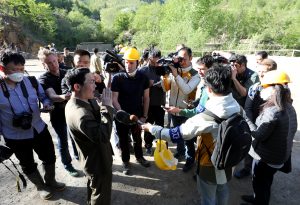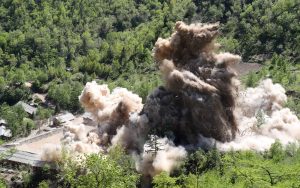
By Stephanie Kelly and Tom Polansek
NEW YORK/CHICAGO (Reuters) – Farmers worldwide are feeling the pinch as fuel costs rise to near four-year highs just as they plant and harvest their fields, eroding agricultural income already hamstrung by depressed crop prices.
The agricultural sector from the United States to Russia, and Brazil to Europe, is seeing profits harmed by the rise in diesel prices. The global oil benchmark, Brent crude, touched $80 a barrel for the first time since late 2014 on Thursday.
Coupled with local economic issues, the increase is making it even harder for many farmers worldwide to turn a profit in the estimated $2.4 trillion agriculture industry, casting a cloud over future investments.
In the United States, fuel accounts for about five percent of farmers’ overall costs, and is hurting margins at a time when farm income is already half that of 2013. Massive harvests have depressed prices of staples such as corn, wheat and soybeans.
Diesel fuel is essential for planting, harvesting, and shipping crops to market. In the United States, farmers will spend an estimated $15.25 billion on fuel and oil in 2018, an 8 percent increase from 2017, U.S. Department of Agriculture data showed.
The price of ultra-low sulfur diesel used for farming equipment and transporting crops has not been this high in May since 2014. Heating oil futures, the proxy for ultra-low sulfur diesel, traded at $2.29 a gallon on Thursday.
Ron Heck, who grows soybeans in Perry, Iowa, said his fuel costs could go up $1,000 to $2,000 during the northern hemisphere’s spring.
“You feel the pain right away,” Heck said.
In Russia, fuel prices for farmers are up 50 percent compared with a year ago, Arkady Zlochevsky, the head of Russia’s Grain Union, a non-governmental farm lobby, told Reuters. Farmers will need to spend more ahead of harvesting, which starts in about a month in Russia, he said.
For a graphic on farmers’ cash expenses, click https://tmsnrt.rs/2rXHHQf
FINANCIAL STRESS
U.S. farms are also factoring in potential losses of income due to a 25 percent tax China announced on major American imports following the U.S. government’s decision to slap duties on steel and aluminum.
“We’re seeing financial stress occurring in agriculture that we probably haven’t seen for a decade or so,” said Scott Brown, director of strategic partnerships at the University of Missouri’s College of Agriculture, Food and Natural Resources. “If diesel prices continue to go higher, it continues to put more pressure on [farmers].”
Net farm income is forecast to fall to $59.5 billion in 2018, an 8.3 percent decline from 2017, according to the USDA. It has fallen by 55 percent since 2013.
In Holly Grove, Arkansas, Tim Gannon paid about $17,000 in February to fill a 7,500-gallon tank with diesel used to run equipment and irrigation. The price increase means it may cost up to 25 percent more, or an extra $4,000, to refill it in coming weeks, he said.
“That’s a fairly significant amount of income to lose,” he said. Gannon has been taking steps to cut his diesel costs over the past year by reducing the number of times he plows, or tills.
In Brazil, farmers are also taking steps to deal with higher costs, as diesel prices have climbed 43 percent in the country since July 2017. Eder Ferreira Bueno, a farmer in grain state Mato Grosso, said increased fuel costs meant he had “no other option but to spend less to treat the soil.” Other farmers might hire fewer workers or delay investment plans, he added.
In neighboring Argentina, the top shipper of soybean meal and oil worldwide, farmers are having to deal with a weakening currency at the same time fuel costs are rising.
“Where the impact is felt greatest is in trucking costs. We are already at a disadvantage when compared to our competitors on freight costs within Argentina,” said David Hughes, a farmer in Buenos Aires province and president of Argentine wheat industry chamber Argentrigo.
In Europe, French grain producers say rising oil costs may have a knock-on effect on fertilizers and crop protection products.
“It comes at a time when things are already difficult for farmers economically,” said Philippe Pinta, head of grain growers group AGPB in Paris.
Wamego, Kansas, farmer Glenn Brunkow said he may lock in diesel prices in advance for the first time ever next year, to avoid the pain of future increases.
“You just kind of all of a sudden realize, ‘Wow, it’s pretty high,'” he said.
(Reporting by Stephanie Kelly in New York and Tom Polansek in Chicago; additional reporting by Sybille de La Hamaide and Valerie Parent in Paris, Polina Devitt in Moscow, Ana Mano and Marcelo Teixeira in Sao Paulo, and Hugh Bronstein in Buenos Aires, Editing by Rosalba O’Brien)










